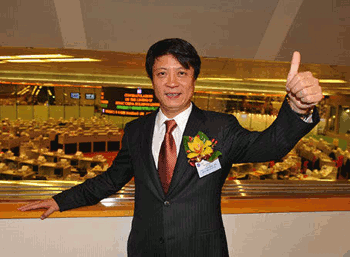
Sunac chairman Sun Hongbin seems to have bought the company without the debt.
The last-minute rescue of Kaisa Group Holdings lost some of its “happily ever-after” element this week when the troubled real estate developer warned creditors not to expect all of the money that they originally were promised.
In a statement yesterday to the Hong Kong stock exchange, where Kaisa is listed, the developer said that its agreement with Sunac to buy out 49.3 percent of the company was contingent on the restructuring of its existing debt facilities, and that it has begun reviewing options with regards to both its onshore and offshore obligations.
Kaisa was saved from becoming the first Chinese real estate developer to default on its overseas bond obligations when, on February 4th, Sunac Holdings agreed to buy out the shares belonging to the family of former Kaisa chairman Kwok Ying-shing.
Don’t Expect All of Your Money
In its statement to the stock exchange, Kaisa – which has hired California-based investment banking firm Houlihan Lokey to advise on its debt restructuring – told investors not to expect full payment.
“Whether the Group meets upcoming payments under its existing debt obligations will be based on an
assessment of the overall financial condition of the Group and lenders and bondholders should not expect payments of principal and interest according to existing terms.”
Following last week’s announcements about the share acquisition by Sunac, investors had regained some confidence in Kaisa’s bonds, with the company’s $500 million in notes due in 2020 rapidly rising 10.9 cents to 69.1 cents on the dollar on the day the share deal was announced.
Another set of the developer’s bonds worth $800 million rose 10.6 cents to 69.3 cents on the dollar. Some Kaisa bonds had sunk as low as 32 cents on the dollar after the company had failed to meet multiple debt obligations during January.
Loans First, Offshore Bonds Last
In Kaisa’s announcement today, the company laid out a schedule for working out an agreement with its creditors that should give some clues as to who gets what when the developer’s financial pie is divided up.
According to the timeframe set out by Kaisa, it intends to reach agreement on a debt restructuring plan with its loan-holders, who are primarily Chinese domestic banks and other financial institutions by the end of March 2015.
For its offshore bondholders, the company hopes to work out a repayment agreement by the end of April.
After Kaisa failed to repay an offshore loan from HSBC on December 31st, and then defaulted on an obligation on its $500 million bond on January 8th, several domestic financial institutions successfully went to court to have the developer’s bank accounts and other assets frozen.
Offshore bondholders, who have much less leverage, will also be the last to be repaid under any restructuring plan, and seem to be in line for a substantial haircut.
Kaisa Hurting Other Guangdong Developers
While China’s real estate developers are slowing creeping back into the international bond market after Kaisa’s default led to a practical moratorium on the issue of new notes from the whole industry during January, the clearer view of risk that the company’s crisis has provided appears to be driving up the cost of borrowing.
Guangzhou-based developer Evergrande Real Estate Group announced yesterday that it had priced a new issue of five-year US$1 billion senior notes due 2020, but had to pay an annual interest rate of 12 per cent.
The company, which is already highly leveraged, is said to be paying a much higher rate than it would have before the Kaisa defaults in January.
Shanghai-based Shimao Property also had to pay up to cash up earlier this month, offering an 8.375 percent yield in order to sell an $800 million seven-year bond at the beginning of February.
Leave a Reply